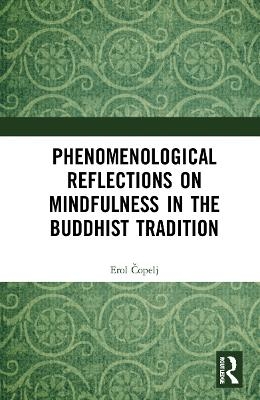
Phenomenological Reflections on Mindfulness in the Buddhist Tradition
Seiten
2024
Routledge (Verlag)
978-1-032-11249-7 (ISBN)
Routledge (Verlag)
978-1-032-11249-7 (ISBN)
This book offers an original phenomenological description of mindfulness and related phenomena, such as concentration (samadhi) and the practice of insight (vipassanā). It demonstrates that phenomenological method has the power to reanimate ancient Buddhist texts, giving new life to the phenomena at which those texts point.
This book offers an original phenomenological description of mindfulness and related phenomena, such as concentration (samādhi) and the practice of insight (vipassanā). It demonstrates that phenomenological method has the power to reanimate ancient Buddhist texts, giving new life to the phenomena at which those texts point.
Beginning with descriptions of how mindfulness is encountered in everyday, pre-philosophical life, the book moves on to an analysis of how the Pali Nikāyas of Theravada Buddhism define mindfulness and the practice of cultivating it. It then offers a critique of the contemporary attempts to explain mindfulness as a kind of attention. The author argues that mindfulness is not attention, nor can it be understood as a mere modification of the attentive process. Rather, becoming mindful involves a radical shift in perspective. According to the author’s account, being mindful is the feeling of being tuned-in to the open horizon, which is contrasted with Edmund Husserl’s transcendental horizon. The book also elucidates the difference between the practice of cultivating mindfulness with the practice of the phenomenological epoché, which reveals new possibilities for the practice of phenomenology itself.
Phenomenological Reflections on Mindfulness in the Buddhist Tradition will appeal to scholars and advanced students interested in phenomenology, Buddhist philosophy, and comparative philosophy.
This book offers an original phenomenological description of mindfulness and related phenomena, such as concentration (samādhi) and the practice of insight (vipassanā). It demonstrates that phenomenological method has the power to reanimate ancient Buddhist texts, giving new life to the phenomena at which those texts point.
Beginning with descriptions of how mindfulness is encountered in everyday, pre-philosophical life, the book moves on to an analysis of how the Pali Nikāyas of Theravada Buddhism define mindfulness and the practice of cultivating it. It then offers a critique of the contemporary attempts to explain mindfulness as a kind of attention. The author argues that mindfulness is not attention, nor can it be understood as a mere modification of the attentive process. Rather, becoming mindful involves a radical shift in perspective. According to the author’s account, being mindful is the feeling of being tuned-in to the open horizon, which is contrasted with Edmund Husserl’s transcendental horizon. The book also elucidates the difference between the practice of cultivating mindfulness with the practice of the phenomenological epoché, which reveals new possibilities for the practice of phenomenology itself.
Phenomenological Reflections on Mindfulness in the Buddhist Tradition will appeal to scholars and advanced students interested in phenomenology, Buddhist philosophy, and comparative philosophy.
Erol Čopelj received his Ph.D. in Philosophy from Monash University, Australia and Warwick University, UK. His published work has appeared in Husserl Studies, Phenomenology and the Cognitive Sciences, and The Routledge Handbook of Phenomenology and Phenomenological Philosophy (2020).
Introduction
Part I
1. Mindfulness in Literature and Everyday Life
2. The Definition of Mindfulness in the Pāli Nikāyas
3. Mindfulness in the Contemporary Literature, a Critical Analysis
Part II
4. Mindfulness in the Husserlian Context
5. Radicalising the Reduction
6. A Phenomenology of Mindfulness, and Related Phenomena
7. Mindfulness in Action
Conclusion
| Erscheinungsdatum | 31.01.2024 |
|---|---|
| Zusatzinfo | 10 Line drawings, black and white; 10 Illustrations, black and white |
| Verlagsort | London |
| Sprache | englisch |
| Maße | 152 x 229 mm |
| Gewicht | 453 g |
| Themenwelt | Geisteswissenschaften ► Philosophie ► Östliche Philosophie |
| Geisteswissenschaften ► Religion / Theologie ► Buddhismus | |
| ISBN-10 | 1-032-11249-2 / 1032112492 |
| ISBN-13 | 978-1-032-11249-7 / 9781032112497 |
| Zustand | Neuware |
| Informationen gemäß Produktsicherheitsverordnung (GPSR) | |
| Haben Sie eine Frage zum Produkt? |
Mehr entdecken
aus dem Bereich
aus dem Bereich


